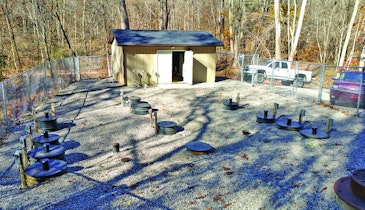The National Onsite Wastewater Recycling Association’s 19th Annual Technical and Education Conference focused on the challenges and solutions of subsurface discharge. The conference, at the Millennium Hotel in St. Louis, Mo., Oct. 25-28, prepared industry professionals for changes such as an expected Illinois ban on direct discharge of secondary effluent, to take effect on Jan. 1, 2013.
Here are some highlights of the conference:
Opening shots
The general session Tuesday, Oct. 26, covered surface discharge-related experiences in Iowa, Ohio and Maine. U.S. EPA regional wastewater officials Alex Owutaka and Morris Beaton offered their perspectives from the Midwest. Illinois state legislator Mike Tryon discussed recent legislation addressing surface discharge problems.
Other presentations covered permitting, codes, compliance, record-keeping and enforcement. With agencies limited by staff and budget, the best opportunity to discover surface discharges that require NPDES permits is through time-of-transfer inspections. Health departments often have no regulatory follow-up until a complaint is filed.
New NSF standards
Two new NSF standards are nearing completion. Draft NSF Standard 360, Field Performance Verification, establishes consistent site selection, sampling, laboratory analysis, and data evaluation methods for obtaining field performance results for systems meeting CBOD5 and TSS requirements and nitrogen reduction.
Draft NSF Standard 350, Onsite Residential and Commercial Reuse Treatment Systems, establishes minimum materials, design and construction, and performance requirements for onsite residential and commercial reuse treatment systems. Systems can be evaluated for treating bath water only, laundry water only, or both. Reuse applications include toilet and urinal flushing and surface irrigation.
Winners
NOWRA executive director Eric Casey reported on a 2008 study by the William E. Smith Institute for Association Research showing that associations help make professionals successful. During a business session on Wednesday, Oct. 27, Casey observed, “Associations provide a critical venue for successful people in a profession or industry to access resources, identify themselves, network with their peers, and form mutually beneficial communities.”
NOWRA seeks to provide benefits such as continuing education and other services as state affiliates request them. Casey said NOWRA has expanded its Resource Library on the Web and plans to help affiliates with newsletters and provide a database of speakers for association conferences. Since contractors comprise more than three-fourths of the membership, the organization plans more educational opportunities for them.
NOWRA’s participation in the U.S. EPA Partnership for Sustainable Decentralized Wastewater Management Memorandum of Understanding helps keep members abreast of national issues. The association is exploring hiring a Washington lobbyist to secure more federal funding for the onsite industry. The directors also are considering a presence on Facebook, posting Septic Locator on Twitter, and allowing vendors to upload product information to the NOWRA website.
According to president-elect Dick Otis, NOWRA plans to create a quality installation checklist and treatment process fact sheets for homeowners, and a responsible management entity (RME). The Model Code is to be updated to include soil components, regional rules, and barriers to implementation at state levels.
Massive fraud
Link Summers, author of onsite sections and statues for New Mexico, discussed permit fraud in the industry and the lack of regulations to protect consumers. He cited an audit by the state Environmental Health Department of liquid waste permits issued by one from 2005-10. It revealed that 70 percent of the permits are invalid or defective. Banks or homeowners noticed the fraud during foreclosures or time-of-sale inspections.
Summers said the only way for homeowners and installers to protect themselves is to require written contracts for design, installation, maintenance, inspection, testing and pumping. The sections should have minimum requirements that include quantities and specifications for materials and labor, and performance schedules.
In the field
Thursday’s field trip covered five treatment systems in St. Charles County. Wastewater system inspector Sandy May, from St. Charles County Government Building Division, conducted the tours, which proved the necessity of maintenance agreements.
One site had a recirculating sand filter growing weeds and a small tree, which May said she would ask the homeowner to remove. Another site had too much effluent in the distribution box and a soggy conventional drainfield, and May planned to contact the installer to adjust the flow from the distribution box.
A third site with on-demand dosing had effluent ponding on a Wisconsin mound. May was to contact the installer to install time dosing, which would solve the problem caused by the residents washing six loads of laundry per day.
Other sites included a tavern with two 1,000-gallon septic tanks and a 3,000-gallon time-dosed pump tank to a biofilter, and a dressage training facility with ATU, distribution box, and 500 feet of drainfield.
New tools
The Tabletop Expo attracted 21 manufacturers of pretreatment and related technologies. Among new offerings was the Advanced Enviro-Septic wastewater treatment system from Presby Environmental in Whitefield, N.H.
The system also can replace failed drainfields in a smaller footprint. The flexible pipe treats flows directly from the septic tank, removing 99 percent of pollutants without mechanical devices or computer controls. A three-bedroom home requires 250 feet of pipe, which adapts to any configuration or slope. The product meets NSF Standard 40 Class 1 Certification.
Looking to 2011
NOWRA will hold a Superconference June 16-20 at the Hyatt Regency in Columbus, Ohio in conjunction with the National Environmental Health Association and the State Onsite Regulators Alliance. Watch for more information at www.nowra.org.





